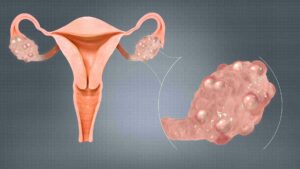Living with Polycystic Ovary Syndrome (PCOS) can be challenging on its own, with its myriad of hormonal imbalances and associated symptoms. However, when combined with hypertension, the challenges can multiply, impacting both physical and emotional well-being. This blog aims to provide valuable insights and practical strategies for PCOS hypertension treatment options. From understanding the link between these conditions to exploring effective treatment options, we’ll delve into the holistic approach needed to manage both aspects for optimal health.
Contents
What Is The Connection Between PCOS And Hypertension?
 Polycystic Ovary Syndrome (PCOS) and hypertension (high blood pressure) are two distinct medical conditions. But they can be interconnected through various physiological mechanisms. Here are some key connections between PCOS and hypertension:
Polycystic Ovary Syndrome (PCOS) and hypertension (high blood pressure) are two distinct medical conditions. But they can be interconnected through various physiological mechanisms. Here are some key connections between PCOS and hypertension:
- Insulin Resistance
Both PCOS and hypertension have been linked to insulin resistance. In PCOS, the body’s cells become less responsive to insulin, leading to elevated insulin levels. Insulin resistance is also associated with hypertension as it can impair the normal relaxation of blood vessels, contributing to increased blood pressure.
- Hormonal Imbalances
PCOS is characterized by hormonal imbalances, including elevated levels of androgens (male hormones) and disrupted levels of female hormones like estrogen and progesterone. These hormonal disturbances can contribute to hypertension by affecting blood vessel function and fluid balance.
- Inflammation
Chronic inflammation is associated with both PCOS and hypertension. Inflammation can contribute to insulin resistance and endothelial dysfunction, affecting blood vessel health. This, in turn, may lead to increased blood pressure.
- Sympathetic Nervous System Activity
Dysregulation of the sympathetic nervous system, which controls the “fight or flight” response. It has been observed in both PCOS and hypertension. Increased sympathetic activity can lead to elevated heart rate and blood pressure.
- Endothelial Dysfunction
PCOS and hypertension are associated with endothelial dysfunction, which impairs the ability of blood vessels to dilate properly. This dysfunction contributes to increased resistance in the blood vessels, leading to elevated blood pressure.
It’s important to note that while these connections exist, not every individual with PCOS will develop hypertension, and vice versa. Regular medical check-ups and addressing risk factors are essential for individuals with PCOS to reduce the likelihood of developing hypertension and its associated complications.
What Are Some Medical PCOS Hypertension Treatment Options?
The PCOS hypertension treatment approach for individuals typically involves a combination of lifestyle modifications and, in some cases, medications. It’s essential to consult with healthcare professionals to develop a personalized treatment plan based on individual health factors. Here are some medical PCOS hypertension treatment options to help:
Insulin-Sensitizing Medications
Metformin is a widely used medication for individuals with PCOS, particularly those who exhibit insulin resistance. By enhancing the body’s response to insulin, Metformin helps control blood sugar levels. Its potential positive impact on blood pressure is attributed to its role in improving insulin sensitivity. This medication may contribute to the overall management of hypertension in individuals with PCOS, addressing both conditions simultaneously.
Oral Contraceptives
Birth control pills, containing a combination of estrogen and progestin, are commonly prescribed for women with PCOS to regulate menstrual cycles and manage hormonal imbalances. Some formulations may have additional benefits related to blood pressure regulation. Estrogen, for instance, can have vasodilatory effects, helping to relax blood vessels and potentially contribute to lower blood pressure levels.
Anti-Androgen Medications
Spironolactone is often prescribed to manage the symptoms of hyperandrogenism in PCOS, such as acne and hirsutism. Beyond its anti-androgenic effects, spironolactone is a potassium-sparing diuretic. This means it can help the body eliminate excess sodium and water, potentially aiding in the management of hypertension by reducing fluid retention and lowering blood volume.
Antihypertensive Medications

- Angiotensin-Converting Enzyme (ACE) Inhibitors: ACE inhibitors are a class of medications that interfere with the production of angiotensin II, a hormone that constricts blood vessels. By inhibiting this process, ACE inhibitors promote blood vessel dilation, leading to decreased resistance and lower blood pressure levels.
- Angiotensin II Receptor Blockers (ARBs): Similar to ACE inhibitors, ARBs act on the renin-angiotensin-aldosterone system to block the effects of angiotensin II. This results in vasodilation and reduced blood pressure, making ARBs another effective option for individuals with PCOS and hypertension.
- Calcium Channel Blockers: These medications inhibit the influx of calcium into cells, preventing smooth muscle contraction in blood vessels. By promoting vasodilation, calcium channel blockers reduce resistance in the arteries, leading to lower blood pressure. This class of drugs is commonly used to manage hypertension in various patient populations, including those with PCOS.
Statins
Statins are prescribed to individuals with PCOS and hypertension who also have elevated cholesterol levels or other cardiovascular risk factors. By inhibiting the production of cholesterol in the liver, statins help manage lipid levels in the bloodstream. This can reduce the risk of atherosclerosis and cardiovascular events. And, providing a comprehensive approach to the management of coexisting conditions.
Regular Monitoring and Adjustment
Regular monitoring of blood pressure, hormonal levels, and overall health is crucial for individuals with PCOS and hypertension. Healthcare providers can make adjustments to the treatment plan as needed, ensuring that medications are effective and well-tolerated. This ongoing collaboration between patients and healthcare professionals is essential for optimizing treatment outcomes and addressing the unique needs of each individual.
Incorporating a combination of these medical treatments, along with a commitment to healthy lifestyle practices, can provide a comprehensive approach to managing PCOS hypertension. Ultimately, promoting overall well-being and reducing the risk of associated complications.
What Foods Are Good For PCOS And Hypertension?
 Adopting a balanced and nutritious diet is essential for individuals managing both Polycystic Ovary Syndrome (PCOS) and hypertension. Here are some foods that can be beneficial for individuals with these conditions:
Adopting a balanced and nutritious diet is essential for individuals managing both Polycystic Ovary Syndrome (PCOS) and hypertension. Here are some foods that can be beneficial for individuals with these conditions:
1. Whole Grains
Foods like brown rice, quinoa, whole wheat, and oats are rich in fiber and can help regulate blood sugar levels. The fiber content also supports heart health by promoting satiety and aiding in weight management.
2. Fruits and Vegetables
Colorful fruits and vegetables are high in antioxidants, vitamins, and minerals. These nutrient-rich foods contribute to overall health and may help reduce inflammation associated with both PCOS and hypertension. Also, berries, leafy greens, and citrus fruits are excellent choices.
3. Lean Proteins
Opt for lean protein sources like poultry, fish, tofu, legumes, and beans. Protein helps with satiety and can be beneficial for weight management. In addition, fatty fish, such as salmon and mackerel, provide omega-3 fatty acids, which have anti-inflammatory properties.
4. Nuts and Seeds
Almonds, walnuts, chia seeds, and flaxseeds are good sources of healthy fats, fiber, and essential nutrients. These foods can be part of a heart-healthy diet and may contribute to improved insulin sensitivity.
5. Healthy Fats
Include sources of healthy fats in your diet, such as avocados, olive oil, and fatty fish. These fats support cardiovascular health and can be part of a well-balanced eating plan.
6. Low-fat dairy or Dairy Alternatives
Opt for low-fat or fat-free dairy products, or consider dairy alternatives like almond or soy milk. Thus, these options provide calcium and vitamin D while limiting saturated fats.
7. Whole Foods and Minimally Processed Foods
Choose whole, unprocessed foods over highly processed ones. Whole foods retain more nutrients and are generally lower in added sugars, salt, and unhealthy fats. Processed foods, on the other hand, may contribute to inflammation and worsen insulin resistance.
8. Green Tea
Green tea contains antioxidants and has been studied for its potential positive effects on cardiovascular health. Because it is a good alternative to sugary beverages and may contribute to overall well-being.
It’s important to note that individual dietary needs may vary. Hence, consulting with a registered dietitian or healthcare professional can help create a personalized nutrition plan.
Is High Blood Pressure Normal With PCOS?
High blood pressure, clinically known as hypertension, is not inherently considered a normative feature of PCOS. However, research suggests a noteworthy association between PCOS and an increased risk of developing hypertension. Women with PCOS often exhibit insulin resistance, hormonal imbalances, and obesity. All of which are recognized risk factors for hypertension. Insulin resistance, a cardinal feature of PCOS, may contribute to endothelial dysfunction and abnormal blood vessel responses, consequently elevating blood pressure.
Therefore, while high blood pressure is not an inherent characteristic of PCOS, the interplay of its associated metabolic and hormonal disruptions may heighten the likelihood of hypertension. It is imperative to acknowledge the multifaceted nature of PCOS. And its potential implications on cardiovascular health, including the risk of hypertension. Regular monitoring of blood pressure, along with proactive management of insulin resistance and hormonal imbalances, is pivotal for individuals with PCOS.
Conclusion
In conclusion, PCOS hypertension treatment requires a holistic approach that combines lifestyle modifications and, when necessary, medical interventions. Understanding the connections between PCOS and hypertension is crucial for effective management. Thus, incorporating a balanced diet rich in whole foods, regular exercise, and stress-reducing techniques can positively impact both conditions. Regular monitoring and collaboration with healthcare professionals play a key role in tailoring the treatment plan.
Overall, by adopting a comprehensive strategy that embraces both physical and emotional well-being, individuals can strive towards optimal health and a better quality of life. If you are facing PCOS-related issues, PCOS treatment at HerMantra can help. Book your free trial online pcos treatment session now.


